#my mom recommended me to watch the two other big jordan peele films (us & get out) so i did over the weekend
Note
Just watched Jordan Peele's Nope, and rest assured I need to sleep with the lights on now.
!!!!!!!!!!!!i fucking LOVED the shit out of nope my goddd so incredibly done in every right.. the gordy's home scenes and the inside of jean jacket eating scene....... everything i've ever wanted out of cinema and more thank you mr jordan peele for my entire life
#my mom recommended me to watch the two other big jordan peele films (us & get out) so i did over the weekend#and ohhhhhh myyy god ive never been big on movies but now i finally have a favorite director to name drop if im ever asked#the realization that the reason im in love with horror but have never really cared for ''horror movies'' in the classic american mainstream#sense is more than just because they're all uncreative slasher shit but. because it's all some white ass bullshit as well.#sammy in my ask box#us is so beautiful#im sorry i'll shut up But what's especially impressive about nope from a more personal standing is how i usually dont really gaf about#extraterrestrial or alien stuff as much as supernatural but this one was still able to enamor me
6 notes
·
View notes
Text
What Is The Shape Of Your Monster? – Get Out and Thought-out Horror
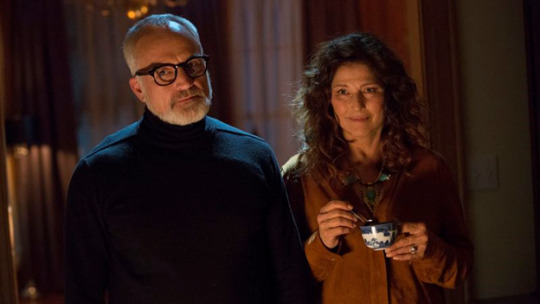
Get out.
No, I’m dead serious. If you haven’t already seen Jordan Peele’s Get Out yet, I need you to do me a massive favor. I need you to bookmark this page, close this page, and absolutely do not read this page— or any other essay or article on Get Out— until you’ve finished watching it.
I’m not just saying this because this essay will contain major spoilers for a movie that is best enjoyed going in knowing as little as possible— I mean, yes, it will— but most of all I just want as many people to see this movie as possible. It is by far the most socially relevant American movie to come out this year, at time of writing, if not one of the most socially relevant pieces of American art of the past decade.
It’s also just a very good movie.
(SPOILERS START NOW)
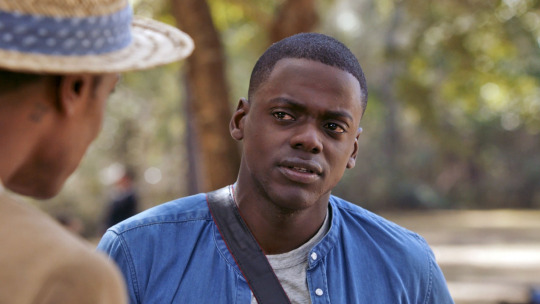
If there was really any complaint I had about Get Out, it would be that the trailers gave a little too much away. If you’ve seen even one you’ve basically got a pretty decent Wikipedia summary of the first two-thirds of the story. Chris Washington, a young photographer, goes on a weekend get-away with Rose Armitage, his girlfriend of four months, to meet her parents for the first time. It’s a pretty big step in any relationship, but Chris has an extra level of anxiety: Rose is white, he’s black, and apparently she’s forgotten to mention that to her family. Despite Rose’s reassurances, her family is awkward, if well-meaning, whenever the topic of Chris’s race comes up— but as the weekend goes on, Chris begins to pick up traces of something more sinister about the Armitages and their entourage of cultured friends.
The trailers establish that, no, Chris is not just paranoid, something terribly wrong is going on here, and (perhaps unfortunately) a lot of the most terrifying scenes are featured prominently in the movie’s marketing— the lingering, uncomfortable shot of Georgina’s tight smile as she weeps uncontrollably, for example, and of course, the almost-sure-to-soon-be-iconic “sink into the floor” scene. During my first watch of the movie I was surprised to see that it’s established very early on that Rose’s mom, Missy, is a psychiatrist who uses hypnosis as a treatment, so I felt a little less irritated at the trailers seemingly spoiling the use of hypnosis as a part of the story.
But here’s the thing— it WASN’T a spoiler. Hypnosis is a part of the plot, but the way it’s presented made me (as well as Chris’s friend Rodney) initially assume that the Armitages were hypnotizing black people into becoming slaves— and amazingly enough, the truth is actually far more horrifying.
I don’t think this was an accident.
You see, what makes Get Out good (and different!) is that it flips several conventions of horror films. The horror genre as a whole is usually based around a fear of “the other,” be it monstrous or metaphorical, but Chris, as a black man among white people, is actually the true Other, and the movie examines how terrifying it truly is to be “Othered.” Rose, the likable, charming, seemingly pure and innocent (white) ingenue who might be the coveted Final Girl of another horror film turns out to be the coldest, most manipulative, and by far the most vicious member of the Armitage family. And Rod already would be an anomaly in most horror movies simply by virtue of actually going to authorities and loudly questioning (alongside the audience) the shady things happening around Chris. But Get Out takes his character a step further, because Rod— portly, goofy, a little on the uncouth side— would almost certainly be on the Killed-Off-Comedy-Relief block in most other movies. Instead, it was the sight of him stepping out of a car that signaled to viewers that Chris was finally saved. I don’t think I’ve ever seen a theater of moviegoers as happy as the one I sat in when Get Out turned the Funny Friend character into the hero of the movie.
This is why I believe the marketing of Get Out was intentionally leading the audience towards the “hypnotism” angle: because Get Out is a seriously well-thought out movie. I can’t describe it any other way— it’s smart. Not simply in the sense of the very relevant themes it covers, but in how it works as a horror movie. Here where I’m going to ask you to do a second thing— whenever you can, go see Get Out a second time (third and fourth and so on, that’s up to you), and see how many things either foreshadow later events or hold important double meanings. I was very surprised to learn this was Jordan Peele’s very first foray into the horror genre (his typical genre of choice is actually comedy) because he’s slipped into the role of “horror writer” like he was made for it. Apparently Peele is at least a little confident in himself as well, because he’s mentioned in at least one interview now that he would like to direct several other films fitting in the “social horror” genre of Get Out, and I know I for one will be eager to see more from him.
Speaking of the idea of “social horror,” you really can’t talk about Get Out without the politics behind it. All art is, by nature, political in some way, but Get Out really gets into it, pulling double shifts as psychological horror and biting social satire. Get Out is a movie about race, but specifically about being a black person in modern America (specifically-specifically, about being a black man in modern America).
As such, as much as I found myself nodding sympathetically at some of the awkward party scenes and finding some of the lines of Rose’s parents familiar (recognizing those words on notable ‘woke’ white lips), I rather not write about what Get Out says about how it’s like being black in this country. I’m not white, but I’m not black either (Venezuelan-Cuban, if you’re curious), and Get Out is a movie very specifically and firmly about black people. I much rather leave that part of the discussion to black writers— this piece by Robert Jones Jr and Law Ware is a good place to start— and I encourage other non-black writers to do the same.
Instead, I’d like to talk more about something Get Out does differently that can apply to all stories, regardless of politics, genre, or medium. Specifically, I want to discuss the way Peele writes his antagonists.
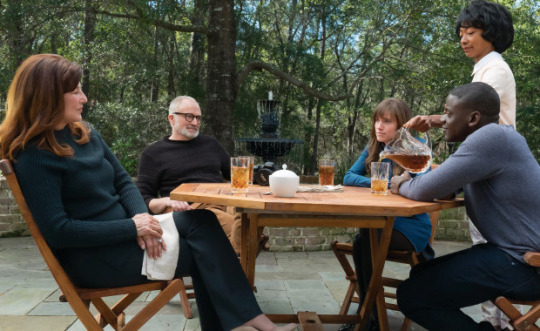
Lanre Bakare wrote a very good essay about his thoughts on Get Out, and I definitely recommend it alongside the Jones/Ware piece. In particular, this section jumped out to me:
“The villains here aren’t southern rednecks or neo-Nazi skinheads, or the so-called “alt-right”. They’re middle-class white liberals. The kind of people who read this website. The kind of people who shop at Trader Joe’s, donate to the ACLU and would have voted for Obama a third time if they could. Good people. Nice people. Your parents, probably. The thing Get Out does so well – and the thing that will rankle with some viewers – is to show how, however unintentionally, these same people can make life so hard and uncomfortable for black people. It exposes a liberal ignorance and hubris that has been allowed to fester. It’s an attitude, an arrogance which in the film leads to a horrific final solution, but in reality leads to a complacency that is just as dangerous.”
I’ve bolded the most relevant parts for emphasis. I can’t remember who said it (there’s probably several mis-attributed sources) but there’s a quote somewhere out there about how the best villains don’t realize they’re villains.
There’s a very small but telling detail in one scene, in which Rose’s brother, Jeremy, plucks at a small guitar while eyeing Chris. It’s a pretty clear nod to the famous banjo scene in Deliverance, which may seem odd at first. Rose’s family is as far as you can get from the crass, degenerate rednecks who terrorize that movie’s protagonists. But that’s it exactly. The Armitages and their friends are cultured, intelligent, even funny and charming at times—and yet they’re all still doing something that’s utterly, completely, uncompromisingly terrible, because they don’t see it as terrible at all. In fact, they most likely believe what they’re doing is actually good—what could be evil about extending the life of loved ones, or allowing friends to “trade up” physically? There’s actually a twisted implication that they believe they might be doing a favor for their victims, giving them a “superior mind” to control their “superior genes.”
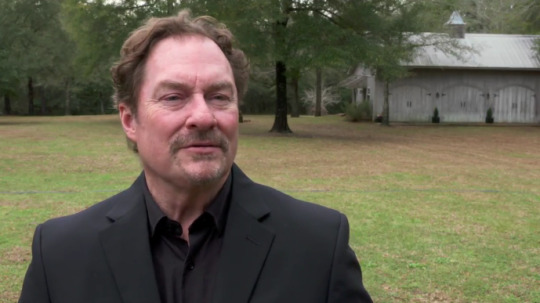
This is where I would like to bring up one aspect of the movie that, as of time of writing, has had very little attention, despite the massive role it plays in the themes of Get Out. The video in which the above photo comes from seems to be the only Get Out interview specifically focusing on Stephen Root and his character, Jim Hudson. It makes sense—from what I can tell, Hudson doesn’t actually show up in any of the movie’s marketing, and he only appears in three scenes. Still, I think he might the best written character in the entire movie, as well as an example to hold up for any writers who want to create believable and terrifying antagonists.
After a series of uncomfortable, cringe-inducing scenes of the Armitages’ party guests, Chris meets Jim Hudson, a blind art dealer who surprises him by saying that he knows his work. Jim is the lone person at the party who doesn’t say something belittling, insensitive, or overly familiar to Chris. He openly scoffs at the ignorance of the other guests and connects to Chris with something personal and important to him. In short, he’s the only person who really treats Chris as an equal—really, as a human.
So of course, it’s all the more shocking when it’s revealed that he’s the winner of the auction.
Hudson’s final scene is when he speaks to Chris in the basement. He’s casually cheery as he explains everything, seemingly unperturbed by the horrible fate he’s about to sentence Chris to. It’s almost comical that the one thing that seems to really trouble him is Chris’s obvious question: “why black people?” Mind you, he’s not troubled because of guilt— he seems to be worried that Chris thinks he’s a racist.
“Honestly though, personally..? I couldn’t give two shits about race. I don’t care if you’re black, brown, green, purple... whatever. What I want is so much deeper: Your eye, man.”
Here’s the thing: out of all the guests bidding on Chris’s body, I believe that Hudson legitimately is the only one who doesn’t give a rat’s ass about race, as far as he thinks. As Chris finally pieces everything together, he flashes back to the party, and suddenly all the seemingly well-intended-if-insensitive interactions betray the true intentions of the guests— a chance to regain glory days for an aging former golf player, a life of better opportunities for a Japanese man, a revitalized young body for the old and sickly husband of a gold digger interested in “the rumors” about black men— all of them are interested in the “benefits” of being black. Jim’s biggest motivation for the procedure is being able to see again, and from what I know there’s no stereotype of one race having better eyesight than any other. I highly doubt he’d care about taking the body of a white person, or any other person. I truly do believe the movie is positing that he’s being honest.
The movie also posits, of course, that doesn’t absolve him at all. Jim treats Chris kindly and respectfully, he doesn’t make any of the gaffs his acquaintances do, he doesn’t believe any of those ludicrous misconceptions about the bodies of black men— and yet, he has no qualms about benefiting from their exploitation. Of course, he’s not racist, he’s just willing to look the other way of black people being violated and dehumanized if it means he can get ahead.
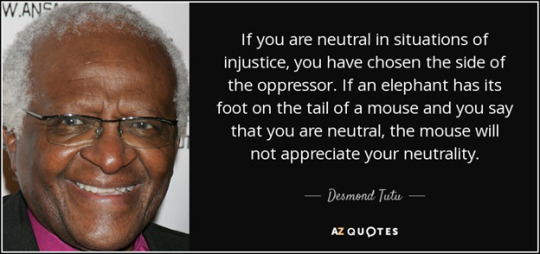
I stay away from most things that self-advertise as “satire,” mostly unintentionally but also because there’s few things that are as painful to watch as bad satire. Luckily, Get Out is extremely good satire, just painful in a different way. I don’t think I’ve ever really gotten what people meant by “biting satire” until watching this movie. It really burrows to the heart of this kind of thinking, and this type of person. It’s brilliant from a standpoint of social commentary, as well as serving as example of how to approach writing a believable, fleshed out antagonist.
And now, I’ll ask you do one final thing. Convince as many people as you can to see Get Out. Blog about it, tweet about it, talk about it— to friends, to family, and especially to people who don’t especially like horror movies or “political” movies. Get Out is a testament to how powerful and provoking horror can be when approached thoughtfully, and it’s bringing up discussions of topics that have never been more relevant to this country. This is the kind of movie I crave to see more of, and I can only hope Peele’s success will allow him to make more of the same while inspiring other creatives to explore what their art can comment on.
Now, go on. Get out of here.
Get Out is now playing on at theaters nationwide.
849 notes
·
View notes